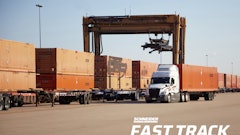
New survey data from Tech.co reveals that U.S. transport and shipping professionals are hesitant to invest in AI due to concerns over data security and a lack of technical expertise.
"It’s clear from our data that logistics professionals aren’t shying away from adopting new AI technology because they’re unconvinced by its long-term potential — rather, it’s more immediate security concerns that are causing some companies to drag their feet. Considering AI’s rapid and rocky development over the past five years, it’s understandable why many are wary. The relative infancy of many AI tools and the patchwork of half-baked regulations that govern them, for instance, could understandably spook decision makers, even those who are usually open to adopting new forms of technology,” says Aaron Drapkin, content manager at Tech.co. “Add the AI-induced data security horror stories that hit the headlines almost every week into the mix, and you’ve got a long list of reasons why adopting the new AI tool everyone’s talking about is a task for tomorrow, rather than one for today.”
Key takeaways:
- 19% of respondents cited concerns over data quality and security as the single greatest barrier to further investing in AI.
- 13% of firms reported a lack of in-house technical expertise to support implementation.
- 17% of respondents identified autonomous vehicles and drones as the most disruptive emerging AI capability for the logistics sector in the next 2-3 years.
- The most common AI use cases are fleet management and telematics optimization (31%) and AI-driven route optimization (29%).
- While autonomous vehicles are seen as the most disruptive future technology, only 7% of firms are currently using them.
- 52% of U.S. transport and shipping companies spend 20% or more of their monthly operating budget on fuel. While 38% describe workforce limitations as critical or of high urgency.
“Having people inside your organization who really know what they’re talking about usually goes some way to alleviating these sorts of anxieties around new technology, but as our data shows, not all transport and shipping businesses have that luxury to hand,” says Drapkin. “Crucially, obtaining this knowledge requires putting significant time and resources into either upskilling existing staff or recruiting specialists. However, in the current economic climate — where core operational expenses like fuel costs are rising — the spare cash needed to make these investments is becoming harder and harder to scrape together. With these immediate financial pressures at the forefront of many decision-makers' minds, and new AI tools far from a safe bet, it’s not hard to see why many transport and shipping companies are forgoing first-mover advantage and focusing on other things."


















